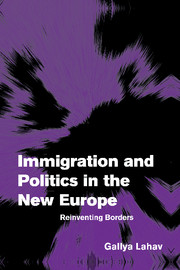Book contents
- Frontmatter
- Contents
- List of figures and tables
- Preface and acknowledgments
- 1 Introduction
- 2 Toward a people's Europe: an institutional analysis of immigration policy in the European Union
- 3 An attitudinal portrait of a people's Europe: a comparative overview of public opinion and elite preferences
- 4 Immigration politics and the new Europe: organizing competing interests
- 5 The “European factor”: institutional and psychological constraints on immigration attitudes
- 6 Conclusions: the construction of a European immigration regime?
- Appendices
- A Data collection and methodology
- B Comparing different measures of attitudes
- C Questionnaire and survey
- D National policy variations in EU countries
- E EU country profiles
- F Selected Eastern and Central European country profiles
- Bibliography
- Index
B - Comparing different measures of attitudes
Published online by Cambridge University Press: 18 December 2009
- Frontmatter
- Contents
- List of figures and tables
- Preface and acknowledgments
- 1 Introduction
- 2 Toward a people's Europe: an institutional analysis of immigration policy in the European Union
- 3 An attitudinal portrait of a people's Europe: a comparative overview of public opinion and elite preferences
- 4 Immigration politics and the new Europe: organizing competing interests
- 5 The “European factor”: institutional and psychological constraints on immigration attitudes
- 6 Conclusions: the construction of a European immigration regime?
- Appendices
- A Data collection and methodology
- B Comparing different measures of attitudes
- C Questionnaire and survey
- D National policy variations in EU countries
- E EU country profiles
- F Selected Eastern and Central European country profiles
- Bibliography
- Index
Summary
In formulating the relationship between what people think and how they may be expected to behave, attitudinal research on immigration needs to be sensitive to issues such as social desirability, accessibility, and intensity of responses. Building on theories of perceived behavioral control, recent public opinion studies have reaffirmed the view that attitudes predict behaviors when they are highly accessible in the perception process (i.e., they come to mind quickly), independent even of direction and intensity. While it is true that attitudes that are highly accessible are more likely to guide perception and therefore behavior, it is imperative to recognize that there is a myriad of other factors that may inhibit or promote behaviors.
Social norms are especially important in attitudinal studies engaged in sensitive issues. The classic study of the Chinese couple travelling across the United States, conducted by Richard La Piere in the 1930s, revealed how social norms can inhibit behaviors that are thought to derive from attitudes. A thorny problem of all attitudinal research is that of the socially desirable responses. Asking people about issues as politically sensitive as minorities and migrant groups is telling (Hewstone 1986: 50). One way of overcoming the methodological bias of socially desirable responses is to ask people to project about the attitudes of their reference groups. My study on immigration, for example, has considered that publics and elites may more readily report the views of their colleagues and compatriots than their own.
- Type
- Chapter
- Information
- Immigration and Politics in the New EuropeReinventing Borders, pp. 243 - 246Publisher: Cambridge University PressPrint publication year: 2004

